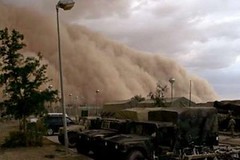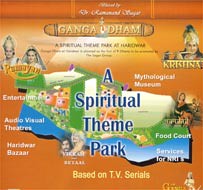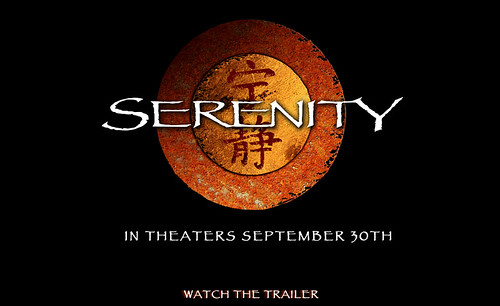I'm afraid my view of Tony Blair is well reflected in this
opinion piece by Charles Moore in the Telegraph.
So I'm sticking by my theory, so far proved right in the two cases in which it has been tested, that all the main Iraq "warmongers" - George W Bush, John Howard in Australia and Tony Blair in Britain - will be re-elected.
Anglo-Saxon political culture still has enough self-confidence not to fear leadership in war, but to see it as a necessary attribute of a robust democracy. Which is a good thing.
It just happens to be unfortunate that, in this case, almost every other reason points to getting rid of Mr Blair and the Government he leads.
Why did the brave war leader not have the courage of his (mistaken) convictions about the euro, and put it to the test? Why does he remorselessly extend the scope and size and spend of the state, infantilising our politics in the process?
Why does he freeze our blood with talk of terrorists, yet move hell and earth to get them into government in Northern Ireland? Why does he not control immigration? Why does he disrespect our history and culture? Why does he fear freedom so much?
Gerard Baker made much the same point in yesterday's editorial in the London Times:
[Hat tip Melanie Phillips]
The lack of serious fiscal choice on offer is only a reflection of a broader surrender to the principle that government has the answers and the people should stop worrying their little heads about it. Every conversation one has in this country seems to start from the premise that everything that ails us can be put right by government — whether it is obesity or the decline of classical music.
And what exquisite irony! The one thing in the past four years that the Government really did get right — the deposing of a dangerous dictator and the liberation of 24 million people from tyranny — is now regarded in the closed circle of serious political discussion as an act of pure evil.
Of course, underpinning, sustaining and nourishing this consensus is a new Establishment that holds the British people in thrall to its supposedly progressive ideas. Its stultifying and baleful influence is transmitted by the clammy grip of its three main tentacles: the universities; the “experts”, and, above all, the media.
On every decision except the Iraq war, I disagree with the way that Tony Blair is leading Britain. But his behavior on the Iraq war was such a marvel of leadership and courage, one wants to forgive him his other sins. And Howard's leadership on this has been abysmal, ambivalent, hypocritical, not in the least farsighted. And extremely cowardly.
It is the quality of leadership under fire and vision in this matter that makes one want to reward Blair. Despite his other mistakes. To quote Moore again:
People keep on attacking Mr Blair about the war in Iraq because they see it as his weakest point. Certainly it displays his cavalier way with facts, his scorn for the process of government, his poor planning.
But it also shows qualities that are inextricably associated with leadership - courage, persuasiveness, energy, a big view about where his country's interests lie, a capacity for action and decision and, unlike Eden over Suez, a capacity to win.
If he had acted the other way - if he had turned aside from America, thrown in our lot with continental Europe, and withdrawn our troops from their global role - he would have reawakened all the old beliefs that Labour can't maintain our most important alliance, can't back our forces and is run from the Left.
The Tories would have had something to say at last, and a Conservative leader would be heading for Number 10.
Reportedly, Margaret Thatcher was so depressed by the state of the election, she's went to Italy, on holiday. Personally, I'd prefer to see a return to William Hague as Tory leader. Although considering an interview I saw with him on CSPAN 2, promoting his latest book, he seems not the least bit inclined right now. But he seemed to have more character than Howard, although I can't say I was following British politics as closely then, so my impression might be entirely wrongheaded. It's all so much easier to follow now.
But I used to love watching his Parliamentary duels with Blair on CSPAN. They were rapturously, dizzyingly clever, both ways. The kind of thing that made an American wish our statesmen had to be put to the test like that on verbal skills, one against the other. Reportedly, Blair used to go back to Downing Street quite depressed each time because Hague had slipped it to him once again.
Kyrgystan or Bust
I imagine we're all very happy we don't have to put up with these kinds of mating rites in our daily lives.
Sandstorm Overtakes Iraq
Wow. Isn't that a fearful something.
The great wall of sand.
Themeparking the gods
Brought to you from the annals of the wonderfully weird. This speaks for itself:
Gangadham,: or the "world's biggest ever mythological theme park". Hindu gods such as Ram, Hanuman and Krishna will be the central attractions for a 'Disneyland on the Ganges' in India.
Ooooh-kay.
And stay tuned, folks: If the project takes off, it will move on to an international level. The plan is to open parks in Trinidad, Bali, Fiji and Thailand - and perhaps even Orlando, Los Angeles and London.
Hat tip - Ann Althouse
636 or Beast
So the whole issue of the fragments being recovered from classical text at Oxyrhynchus is fascinating. Apparently new technology on old text fragments allow scholars to read bits of texts that used to be unreadable by bouncing light off of the atomic remains of ink in the papyrus that can no longer be seen with the naked eye, a technology known as multi-spectral imaging.
"What the technology does," said Columbia University professor of classics and history Roger Bagnall, "is enhance the ink and knock out the background." There are fine differences in the way light bounces off ink, said Mr. Obbink. High-definition digital imaging heightens the contrast to make the ink stand out even if it is sunk deep into the papyrus."The Independent had a story on this last week that apparently contained some puffery, so here is a less excitable, more nuanced and informed account of what is going on from the
NYSun.
It's estimated that they might be finished publishing the important bits in two generations.
snort One of my favorite bits from the article: Apparently they have discovered a fragment of a 3rd century text of Revelations in which the beast was numbered, not 666, but 636.
Heh. Wonder how many End-of-Days Calculations that's going to mess up. And are there any other early text redactions or fragments with 636 instead. In fact, one wonders what is the earliest extant text of Revelations. Heck, there might be whole sects, now disappeared, which based their esoteric interpretations of the text on 636, or beliefs which were later deemed heresies having to do with preferring 636 to 666.
ARCHILOCHOS Fragments
1
I am a follower of my lord Enyalios
and know the Muses' lovely gift.
3
Few bows will be stretched and not many will be
the slings, when Ares at last brings war
into the plain. The brutal work will be for swords.
Our enemy yonder are masters of such warfare,
lords of Euboia, famed for their spears.
4
Come, cup in hand, across the benches of the swift ship
roam and drink deeply from the hollow casks.
Gulp down the red wine to the lees, for we shall not
be able to stay sober on this gaurd.
5
A Saian boasts about the shield which beside a bush
though good armour I unwillingly left behind.
I saved myself, so what do I care about the shield?
To hell with it! I'll get one soon just as good.
114
I do not like a tall commander, strutting about,
primping in curls or with only half a beard.
Give me a short leader you can clearly see
bandy-legged, solid on his feet and full of courage.
19
The affairs of gold-laden Gyges do not interest me
zealousy of the gods has never seized me nor anger
at their deeds. But I have no love for great tyranny
for its deeds are very far from my eyes.
105
Glauchos, look, how deeply the waves toss the sea
and a cloud stands right over the cliffs of Cyrea
So last night at the Seder as we were reading through the Haggadah, I had a thought about the point of the Haggadah.
These days, instead of making a pilgrimage to the Temple and offering a sacrifice, you read through the Haggadah, which is a reenactment text of the service, more or less. It is interesting though, that in comparison the liturgy on Yom Kippur, where the reenactment takes you into the Temple, to the service of the High Priest, as it describes, over and over, his service to God on Yom Kippur and the reaction of the assembly, in this case, the thing being reenacted is the rabbinic service of Passover. So what you are supposed to do, instead of a physical commandment drawn from the biblical text, is to spend the night discussing the meaning of the Exodus.
We were slaves to Pharaoh in Egypt; but God took us out from there, with a strong hand and an outstretched arm. And had the Holy One, blessed be He, not taken our ancestors out of Egypt--we, our children, and our children's children would still be enslaved to Pharaoh in Egypt. Therefore, even if we are all wise, all men of understanding, all well versed in the Torah--we would still be commanded to tell about the Exodus from Egypt; and whoever tells about it at length is worthy of praise.
The thing is, in it's current state at least, it is really a teaching text. You go through the Haggadah, and it takes you through the process of generating a midrash praising and extolling God based on parts of the text of the Exodus. And it teaches you to do that based on the paradigm of Rabbi Eliezer, Rabbi Yehoshua, Rabbi Elazar ben Azariah, Rabbi Akiva and Rabbi Tarfon telling the Pesach story over, all through the night, until it is time to read the morning Shema.
Once Rabbi Eliezer, Rabbi Yehoshua, Rabbi Elazar ben Azariah, Rabbi Akiva and Rabbi Tarfon were all celebrating the Seder in B'nai B'rak. And they told the story of the Exodus from Egypt the entire night, until their students came and told them, "our masters, the time has come for the morning recital of Shem
So first the Haggadah lays out a way to address the questions and attitudes of each of the four sons. More or less, it is setting the intellectual prototyes for how to engage people of varying mindset, from the most engaged to the least engaged.
But after that it goes into some detail itself generating a midrash about the number of miracles performed by God throughout the Exodus and the splitting of the Red Sea. The text is really playing a little game at that point, but the upshot, if you care to examine it, is that the text itself is providing an example of the generation of a midrash. It's revealing the midrashic process in the making.
IOW, you can read the text on two levels. The first, simple level allows you to fulfill the mitzvah of discussing the Exodus at the seder simply by reading through the Haggadah itself. But the second level of the text shows you how to be creative yourself, midrashically speaking. It provides a pattern for you to follow if you are so inclined, to take a verse and expand upon it by interpreting it through the aid of other verses. And it shows you the joy and the zest that this activity held for these particular men. And in that sense it becomes a teaching text, not just as the content it provides, but in terms of showing you how the technique itself and how it works.
In passing, it also provides a remarkable template of how the sages viewed Passover – a holiday celebrated in the elevating discourse that takes place in a group of friends, when one insight can spark others, leading to revelations about the abundance of God's intercession in human affairs. This interactive quality among friends and family, that is their notion of a Passover seder well done.
The Four Stages of Kitniot
So
this piece, by Pillage Idiot, is pretty amusing. In fact, it's damn near perfect:
Numbers are of great significance in Judaism: three forefathers, three festivals, seven days of creation, seven weeks of the omer, 12 tribes, 120 years that Moshe Rabbeinu lived. You get the idea.
The number for Passover is four. Four questions, four glasses of wine, four sons, four helpings of matzah ball soup your Uncle Harry has consumed (but who's counting?).
On Passover, there are also four stages of kitniot: denial, anger, fear, and humor.
...
Leading up to Passover, we spend a good deal of our time trying to rid our homes of chametz, but somehow, somehow, kitniot always loom large. (Cue scary music.)
The first stage of kitniot is denial. "No! Can't be! This makes life so complicated!" ...
The second stage of kitniot is anger. Rarely expressed in public, this anger derives from the unavoidable fact that prohibiting kitniot is in fact meshugas and there's nothing you can do about it...
The third stage is fear. Why fear? Because no one really understands kitniot. We understand shaatnez (the prohibition of wool and linen in the same garment). We understand parah adumah (the red heifer). But we don't understand kitniot...
The fourth and last stage is humor. Unfortunately, most people do not reach this stage. Psychologists will tell you how hard it is to get beyond the fear of kitniot...
Not only that, he cites a really scary
list of things considered to be kitniot –
Anise?
Cumin?
Coriander?
Fennel?
Fenugreek?
Hemp? Gee, now I understand a question someone recently posed elsewhere as to whether or not marijuana had been ruled kosher for passover, like Viagra. I didn't realize the issue was
kitniot. That's hysterically funny. Ground down, the seeds form a kind of wheat-like looking substance, which gives you a rise.
Licorice?
Buckwheat? The problem, I gather, with this one is that it simply has wheat in the title, which makes it confusing enough to be added to the list. In fact, I probably always thought it
was a kind of wheat.
Sheesh!
Kitniot is even scarier than I realized.
Update:
Apparently anise and something that is either cumin, caraway or fennel appear in mishnah brurah, prohibited because they grow in proximity to wheatfields









